- Restoring Every Detail, From Start to Finish
- (801) 263-9990
How to Respond to a Water Damage Emergency in Your Home

How to Deal with Different Types of Floodwater in Your Home
April 23, 2020
5 Tips to Prevent Water Damage to Your Home
April 27, 2020Water damage is bad enough when it is due to a natural disaster, like a flood or an overflowing river. When it comes from inside the house, however, it can cause even more panic. A homeowner should always have control over their household, and should know how to take care of it. But when there’s a busted toilet, leaking HVAC system, or a gurgling sink, it feels like the home is not at all under control.
When dealing with water damage from appliances or house plumbing, you need to have a plan in place to immediately address the most urgent concerns. The damage grows when you hesitate to take action. Though it can be overwhelming, making plans for how you will deal with indoor flooding helps you become less anxious if you ever face a real emergency. Run through this list of questions when dealing with a water emergency:
1. Are your family and your possessions safe?
Your health and safety are at risk when your house gets flooded. Water from pipes may be contaminated and it may also put you at risk for electrocution. When left to stand for days, damp wood can also breed mold, which is dangerous to breathe in.
Keep you and your family safe by shutting off the electricity as you deal with water leaks. Know where to find your circuit breaker and switch it off before addressing the water problem itself. You should also unplug devices and keep them away from the site of the flooding.
If the water level rises and your house threatens to flood, you must evacuate and wait for authorities to inform you that it is safe to return to your home. When you reenter the property, be sure to wear protective gear like rubber gloves and boots, and retrieve your valuables like documents, IDs and passports, and electronics.
2. Do you know the source of the leak?
For circumstances in which you do not need to evacuate, you should strive to contain the leak while waiting for the repairman or plumber. Identify the source of the problem and apply temporary measures to prevent the leak from getting worse. Always have plumbing tape on hand for quick fixes.
The most likely culprits for water damage is a burst pipe or a hot water tank leak. Use your shut-off valves for sinks, toilets, and the heater. If your ceiling is leaking, and it is not coming from a bathroom or a laundry room, then you need to call an expert immediately. Any dank, foul odors or discoloration in your ceiling or walls might indicate that you have mold in your home.
3. Have you notified your insurance provider?
You must inform your insurance company for any serious emergencies that will need you to make a claim. Find out what steps your insurance provider needs you to make for water damage and get a claims adjuster to document the state of your home and estimate the repair costs. You must keep your own records, which you can do by taking photos of the damaged areas and keeping receipts of repairs and restorations.
4. Is there anything to dry and clean?
Once you have the flood in control and your insurance provider notified, you can start the water repair and restoring process. Start with small cleaning tasks you and your household members can handle. Drying and disinfecting the floor, removing and washing area rugs, and segregating between items you can and cannot use are all things your family can do. You can also dry out valuable papers, books or other fragile items that were soaked in the floodwater.
5. Can you start restorations on large items?
Water damage can extend to larger pieces, or entire sections of your home’s structure. When you have a considerable amount of repairs to do, you should turn to water damage cleanup professionals. Experts can handle complications like dealing with the drywall or insulation. They also have special equipment like moisture detectors that can locate residual water, and can give you advice on how to restore your electronics and furniture.
Conclusion
Water damage can scare even the most well-prepared homeowner. Having a plan for when you experience a water emergency at home will help you move beyond anxiety and into action.
If you are looking for water damage repair in Salt Lake City, contact us at AAA Restoration Utah today. We are a licensed, full-service general restoration company handling everything from water damage to mold removal, floor installation, COVID-19 decontamination, and more.
Contact us today so we can work on bringing your home back to its former glory.


